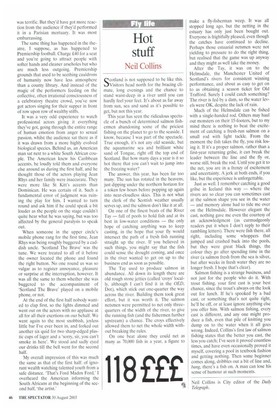Hot stuff
Neil Collins
Scotland is not supposed to be like this. Visitors head north for the bracing climate, long evenings and the chance to stand waist-deep in a river until you can hardly feel your feet. It's about as far away from sun, sea and sand as it's possible to get, but not this year.
This year has seen the ridiculous spectacle of a bunch of determined salmon fishermen abandoning some of the priciest fishing on the planet to go to the seaside. I know, because I was part of the spectacle. True enough, it's not any old seaside, but the aquamarine sea and brilliant white sand of Tongue, right off the top end of Scotland. But how many days a year is it so hot there that you can't wait to jump into the freezing water?
The answer, this year, has been far too many. The sun has rotated in the heavens, just dipping under the northern horizon for a token few hours before popping up again into near-cloudless skies. This is not what the clerk of the Scottish weather usually serves up, and the salmon don't like it at all.
On one of the finest beats of the River Tay — full of pools to hold fish and at its best in low-water conditions — the only hope of catching anything was to keep casting, in the hope that your fly would intersect the path of a fresh fish running straight up the river. If you believed in such things, you might say that the fish could sense the drought coming, and once in the river wanted to get on up to the business end as soon as possible.
The Tay used to produce salmon in abundance. All down its length there are old rough stone jetties (called `croys' locally, although I can't find it in the OED, Dot), which stick out one-quarter the way across the river. Building them took great effort, but it was worth it. The salmon netsmen were permitted to net only threequarters of the width of the river, to give the running fish (and the fishermen further upstream) a chance. The croys effectively allowed them to net the whole width without breaking the rules.
On one beat alone they could net as many as 70,000 fish in a year, a figure to
make a fly-fisherman weep. It was all stopped long ago, but the netting in the estuary has only just been bought out. Everyone is frightfully pleased, even though the catches have continued to decline. Perhaps those estuarial netsmen were not yielding to pressure to do the right thing, but realised that the game was up anyway and they might as well take the money.
After the Tay, it was on to the Helmsdale, the Manchester United of Scotland's rivers for consistent winning performance, and about as easy to get on to as obtaining a season ticket for Old Trafford. Surely I could catch something? The river is fed by a dam, so the water levels were OK, despite the lack of rain.
Much of the Helmsdale can be fished with a single-handed rod. Others may haul out monsters on their 15-footers, but to my mind there is nothing to beat the excitement of catching a fresh-run salmon on a small rod with light tackle. From the moment the fish takes the fly, you risk losing it. If it's a proper salmon, rather than a first-year returning grilse, it can break the leader between the line and the fly or, worse still, break the rod. Until you get it to the net, you are in a frenzy of excitement and uncertainty. A jerk at both ends, if you like, but the experience is unforgettable.
Just as well. I remember catching a good grilse in Iceland this way — where the rivers are so clear you can sometimes cast at the salmon shape you see in the water — and memory alone had to tide me over on the Helmsdale. However elegant the cast, nothing gave me even the courtesy of an acknowledgment (as curmudgeonly readers put it when I don't reply to their rambling letters). There were fish there, all right, including some whoppers that jumped and crashed back into the pools, but they were great black things, the colour they go after spending time in the river (a salmon fresh from the sea is silver, but after weeks in fresh water they are no longer fresh. I hope that's clear).
Salmon fishing is a strange business, and not just for the people who do it. With trout fishing, your first cast is your best chance, since the trout's always on the look out for lunch. If he's spooked by a bad cast, or something that's not quite right, he'll be off, or at least ignore anything else you offer him. With salmon fishing, every cast is different, and any one might produce a fish, even that pile of knitting you dump on to the water when it all goes wrong. Indeed, Collins's first law of salmon fishing states that the better you cast, the less you catch; I've seen it proved countless times, and have even occasionally proved it myself, covering a pool in textbook fashion and getting nothing. Then some beginner comes along, dribbles out a bit of line and, bang, there's a fish on. A man can lose his sense of humour at such moments.
Neil Collins is City editor of the Daily Telegraph.


























































 Previous page
Previous page